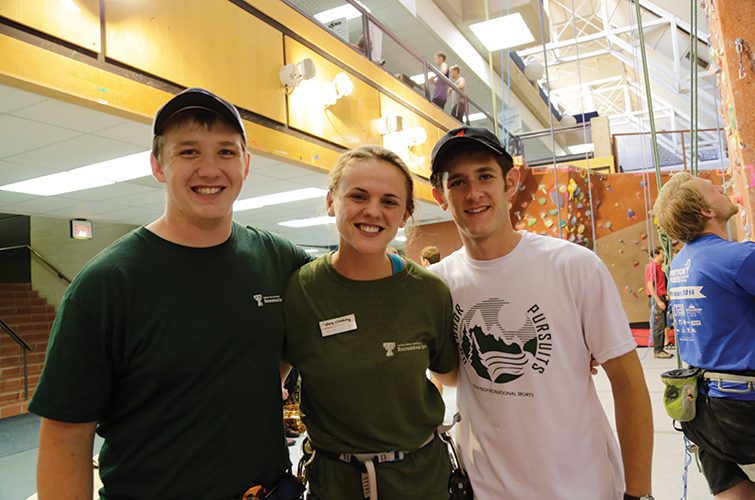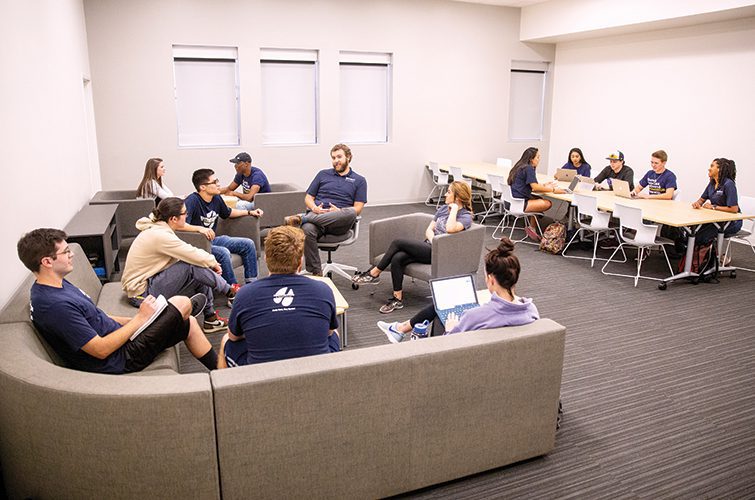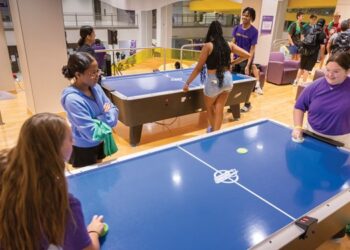Campus recreation’s relevancy is becoming more and more essential to prove to campus leaders. Student success, retention and recruitment are key in doing so.
As the campus recreation industry progresses through the pandemic, it’s more important than ever to prove relevancy to campus leaders. While consistently adapting to changes, being able to show the correlation between your department and the positive impact it has on essential aspects such as recruitment, retention and student success will make all the difference. Below, two recreation leaders share how their department is proving relevancy in these areas.
Campus Recreation’s Relevancy in Student Success
At St. Edward’s University (SEU), Andy Lemons, the senior director of Recreation and Wellness, said the language you use and value you present must continue to focus on the total health and well-being of participants.
“No longer will it be enough to say a large majority of students utilize your services — you must be able to show how that usage translates to student success,” said Lemons. “Be sure you know how your university defines student success, and make sure your assessment strategy is analyzing your department’s impact on this key metric.”
While schools may define student success differently, especially during a pandemic, it’s necessary to go to campus leaders and directly ask them how the school defines it, then take that information to your team and directly contribute to that effort.
For example, Lemons shared at SEU success is defined in terms of holistic well-being. “In an effort to move our programs to focus on holistic well-being, we began administering the American Collegiate Health Association’s national assessment tool on college health, the National Collegiate Health Assessment (NCHA),” he said. “This has become our department’s primary impact assessment tool.”
The NCHA provides data highlighting health and well-being gaps in the student body, allowing the SEU team to deliver services directly tied to student needs. “The tool gave us insight into areas where our students are doing well, and we are able to leverage that data with administrators when speaking about the valuable role Recreation and Wellness plays in the student experience,” said Lemons.

Relevancy in Recruitment
At Texas Tech University, (TTU) Recreational Sports partners with university offices responsible for various student recruitment and orientation programs and activities. One example is the Red Raider Roadshow. Each year professional staff will travel with the Office of Admissions to the state of Texas and regional sites to support recruitment efforts.
“In this role, Recreational Sports is able to engage firsthand and in-person with prospective students and their family members to express the many outstanding programs and services provided to the campus community,” said Eric Maki, the managing director of Recreational Sports at TTU.
Another recruitment program at TTU is Red Raider Orientation. Recreational Sports helps host the annual orientation event for first year and transfer students by providing activity space and programs for students and family members to take part in. Some programs include rock wall climbing, cycle class and enjoying the outdoor pool. The goal is for the programs to be engaging and low on required skill.
“Appreciating many students have still not yet made a final decision on which school to attend when they visit our campus, Recreational Sports helps illustrate the value of the out-of-classroom experience and how through our programs and services, students will find their place on campus and become part of a community, which helps foster engagement and connections,” said Maki.
Relevancy in Retention
Retention directly correlates with a student’s sense of community on campus. At TTU, Recreational Sports offers intramural and sport club programs, outdoor pursuits, and employment to help students find a community they fit into and become a graduate of the university.
“Through intramural and sport club programs, students connect with others on campus and gain a stronger sense of place and value,” said Maki. “Additionally, partnering with Greek Life not only helps these organizations to create healthy competition, but it also creates a mutually beneficial partnership with this campus department.”
Similarly, creating a menu of diverse outdoor trip activities can help students learn new skills, engage with others and create meaningful experiences.
Employment opportunity is common in most recreation departments and an important aspect to promote when working to prove relevancy. “While these students play an essential role in delivering the quality programs and services our department provides, employment is an extremely important aspect of helping to retain students through to graduation,” said Maki. “While the pay a student receives for the work they provide helps with monthly expenses, having a peer group to connect with as they transition from the home environment goes a long way in aiding them to be a valued, contributing member of our community.”

Campus Recreation’s Relevancy: The Negatives of Removing It
In comparison to the positive impact campus recreation has on retention, recruitment and student success, it can be necessary to show how the removal of campus recreation can negatively impact these areas as well. For example, Maki elaborated the absence of leadership experiences, community-oriented programs, and fitness and wellness opportunities would be felt right away.
“Removing programs and services in which all members of the campus community can engage in healthy fitness, leadership, leisure, recreation and wellness activities forces students to look for other, possibly unhealthy activities in which to fill their out-of-classroom time,” he said. “Building community through a variety of student success and leadership programs will help students achieve personal and professional goals leading to a more cohesive student body and future alumni.”










